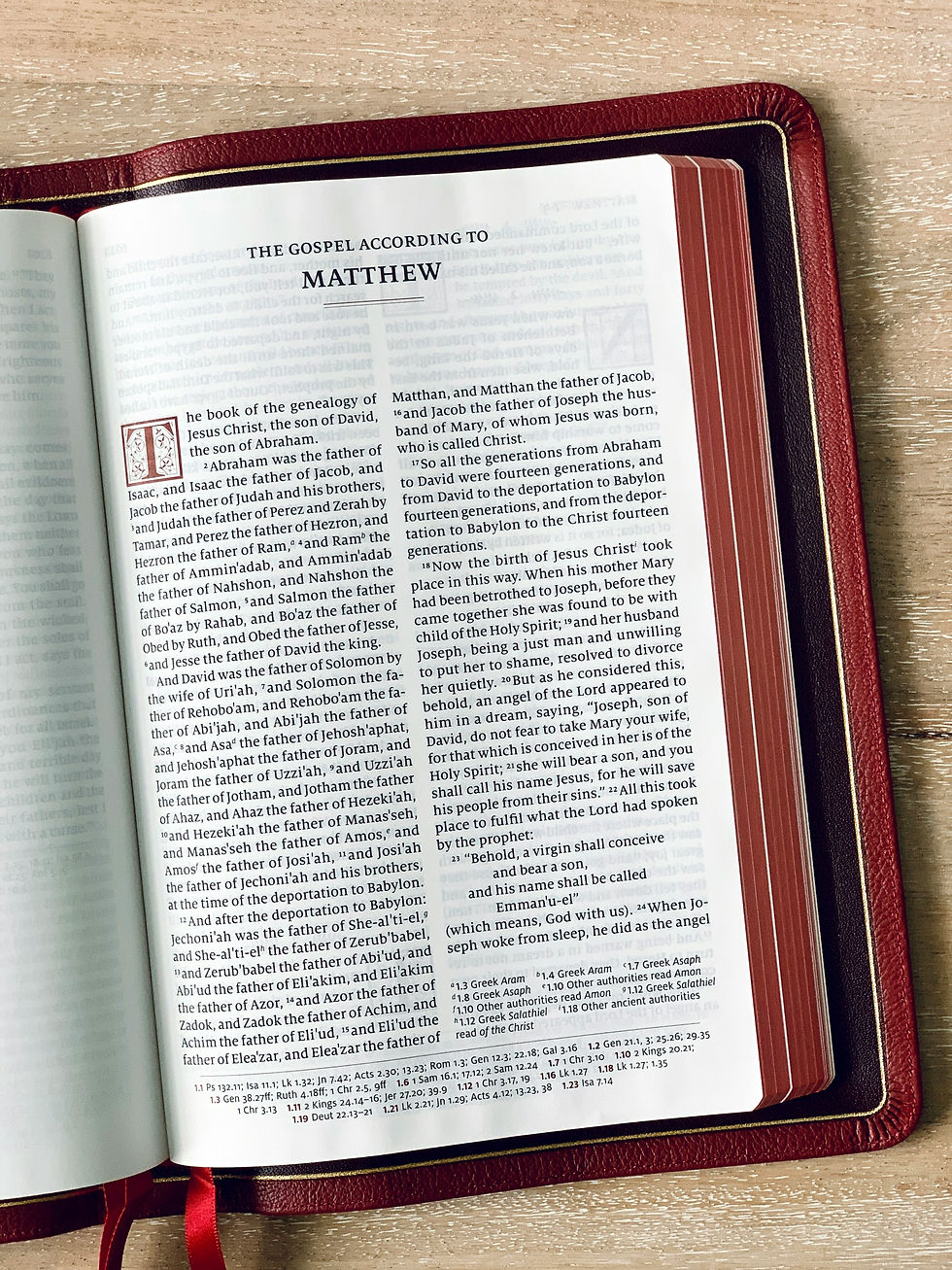
“An account of the genealogy of Jesus the Christ (Messiah), the son of David, the son of Abraham” Matthew 1:1.
Today I begin a long look with you at the Gospel of Matthew. This opening verse calls us to take a look at just this verse because it introduces a genealogy that compresses the entire history of Israel into 17 short verses.
It places the story of Jesus within all of God’s dealings with Israel reaching it’s climax in the birth of the child Jesus. In Matthew’s genealogy we see the credentials of Jesus the Messiah. It traces a royal lineage from “David the king” (verse 6) all the way down to Joseph (verse 16). Here Matthew says that Jesus is not a biological descendent of Joseph and David. Joseph appears not as the father of Jesus but as “the husband of Mary. Of her was born Jesus who is called the Messiah” (verse 16). Matthew shows how Jesus was conceived in Mary not by Joseph but by the Holy Spirit, and named and accepted by Jospeh as his son, making him a true heir of David.
So Matthew’s Gospel begins with the story of creation and the family of Adam and Eve. The words, “An account of the genealogy” is reflective of both the opening of the Book of Genesis and the opening words of John’s Gospel, an announcement of a new beginning for all humanity. “Jesus” is the Greek word for the name “Joshua” which literally means “Yahweh is salvation.” Matthew uses the name “Jesus” 150 times, but in this opening verse it is accompanied by the Kingly or Royal title “Christ”, which means the “Anointed One” in Greek, and the “Messiah” in Hebrew.
Next Matthew introduces Jesus as “the son of David’ before naming Him as “the son of Abraham” — even though David came after Abraham in history. Here Matthew wishes to draw our attention to Jesus’ connection to the great king David. This pushes us to remember the great promises God gave David, that there would be an everlasting kingdom (2 Sam. 7) and the great things God would do: “I will make his kingdom firm…and I will make his royal throne firm forever” (2 Sam 7:12-13). Here Matthew wants to say that Jesus belongs to the chosen people, the descendants of Abraham’s family, the Israelites. So Jesus as “the son of Abraham” hints of the theme of the worldwide blessing in Jesus Christ, in His public ministry, and at the end of the Gospel.
I share these details here to remind you that the beginnings of the 4 Gospels are hugely important, as are the ends of each of the Gospel. Here in Matthew see that God has a plan not only to create but also to save creation — and all of this resides in the name of Jesus Christ. May our focus in Matthew always be on the name of Jesus Christ. May we see the plan Jesus Christ has for all of our lives as well. Stay with Him, and when you sin, run back to Him and resume following Jesus Christ. Let the holy name of Jesus bring us to Christ, so that, as the Apostle Pauls says: “10…at the name given to Jesus every knee should bend, in heaven and on earth and under the earth, 11 and every tongue should confess that Jesus Christ is Lord, to the glory of God the Father” Philippians 2:10-11.
So today, consider the plan that God has for your life and for the lives of the people He has brought into your life. Instead of despairing, turn to Jesus Christ and open your heart to Him.
Lord Jesus Christ, Son of the Living God, have mercy on me a sinner.
From the Bible:
“Jesus said to him, “I am the way, and the truth, and the life. No one comes to the Father except through me” John 14:6.
“Press on toward the goal for the prize of the upward call of God in Christ Jesus” Philippians 3:14.
“The Lord is my shepherd; I shall not want. He makes me lie down in green pastures. He leads me beside still waters. He restores my soul. He leads me in paths of righteousness for his name's sake. Even though I walk through the valley of the shadow of death, I will fear no evil, for you are with me; your rod and your staff, they comfort me. You prepare a table before me in the presence of my enemies; you anoint my head with oil; my cup overflows” Psalm 23:1-6.
Comments